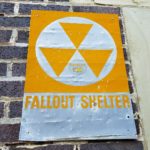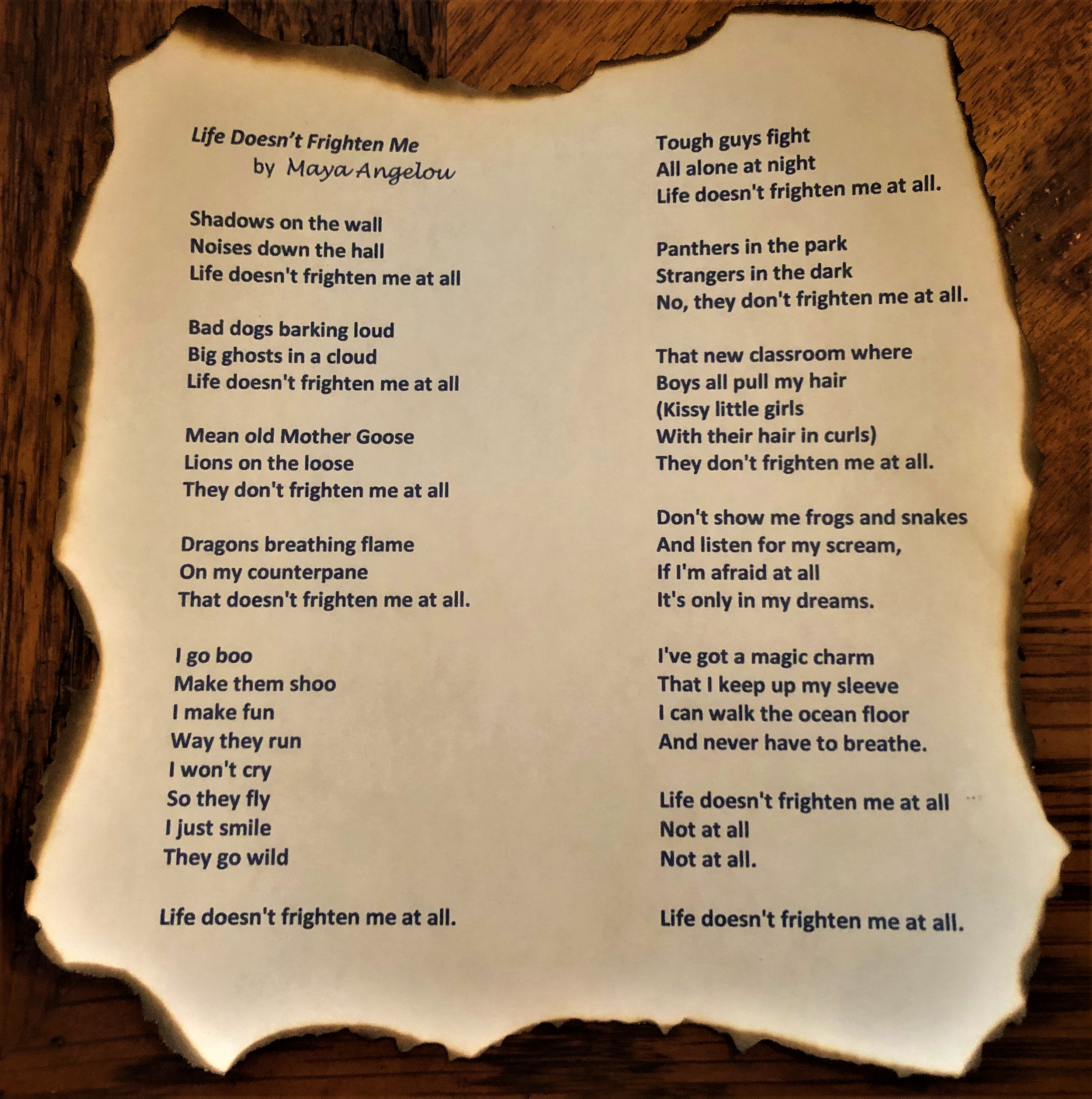“The only thing we have to fear is fear itself.”— Franklin D. Roosevelt
“To conquer fear is the beginning of wisdom.” — Bertrand Russell
Earlier this month, Spanish actress, Paz Vega (Maria de la Paz Campos Trigos) who starred in the movie, Spanglish (among many others), moved back to Spain from the US and granted an interview with Él País. She offered suggestions (criticisms?) of both cultures. Her critique of the American culture? “Americans live in fear.”
This statement both struck me and stuck with me. Later that afternoon, a mental health group I’m a part of entertained the idea of creating an Instagram page. The first 2 responses to that idea? “As long as we’re not liable for the content.” hmmm…this gave me pause. I read it as a fear response.
 Don’t get me wrong, there are actually a number of real fears currently: illness, social unrest, political rife, economic collapse, natural disasters, scarcity, and all types of insecurity. But, realistically, many of those threats come and go over time. If we look hard enough, there is always something we can fear. Lots of folks love to idealize other eras—like the 1950s–as an idyllic time of no worries. But many of the people nostalgic for those years were not there to practice atomic bomb or air raid drills in primary school.
Don’t get me wrong, there are actually a number of real fears currently: illness, social unrest, political rife, economic collapse, natural disasters, scarcity, and all types of insecurity. But, realistically, many of those threats come and go over time. If we look hard enough, there is always something we can fear. Lots of folks love to idealize other eras—like the 1950s–as an idyllic time of no worries. But many of the people nostalgic for those years were not there to practice atomic bomb or air raid drills in primary school.
Fear and its cousin, Anxiety
Fear and its somewhat calmer cousin, anxiety, are necessary emotions. While both are the physiological and cognitive signals of danger, fear strikes quickly. It is intended to keep us safe. Anxiety is much the same except that it is often lingering as a reflection on the past or in anticipation of the future. Fear tends to happen in the face of a perceived threat.
 The fear response, and its associated hormonal changes, is linked to suppressed immune function and cardiac disease problems. Additionally, it can exacerbate and even activate mental illness. When the world is a scary place, there are any number of ways that we might respond—many of which are not adaptive.
The fear response, and its associated hormonal changes, is linked to suppressed immune function and cardiac disease problems. Additionally, it can exacerbate and even activate mental illness. When the world is a scary place, there are any number of ways that we might respond—many of which are not adaptive.
what not to do
I ran across an interesting and informative study that was conducted about managing fear of the Zika outbreak. These researchers found several ways of dealing with fear that do not work:
- working to suppress the thoughts about the fear (“I’m just not going to worry about this”) was shown to make it worse later on.
- reappraising the fear (“this is dangerous but so is driving your car”) did not improve the fear.
- and the contesting strategy (“everyone is just blowing this out of proportion”) also did not help with fear reduction.
The authors go on to note that while it appears logical that minimizing the threat could be helpful, it actually places you in more danger (e.g. “how dangerous could a nursing bison be?”) –Trust me on this—there’s video evidence that a nursing bison is quite dangerous!
What is striking to me in this cultural climate is how fear disrupts our sense of community.
 The world can be a dangerous place. It always has been. AND we cannot let fear paralyze us. MessyMarvelous ran a 5-week series, Tame Your Fear, beginning in late September 2017. It’s not a new topic and those blogs are definitely worth a re-read. But what is striking to me in this cultural climate is how fear paralyzes us, isolates us, and disrupts our sense of community. In her podcast, Michelle Obama referred to that paralysis and said, “Living locked down keeps your aspirations small.” His Holiness the Dalai Lama said, “Fear saddles the mind with needless suspicions and anxiety and blocks the trust and friendship essential to bring real peace and harmony.”
The world can be a dangerous place. It always has been. AND we cannot let fear paralyze us. MessyMarvelous ran a 5-week series, Tame Your Fear, beginning in late September 2017. It’s not a new topic and those blogs are definitely worth a re-read. But what is striking to me in this cultural climate is how fear paralyzes us, isolates us, and disrupts our sense of community. In her podcast, Michelle Obama referred to that paralysis and said, “Living locked down keeps your aspirations small.” His Holiness the Dalai Lama said, “Fear saddles the mind with needless suspicions and anxiety and blocks the trust and friendship essential to bring real peace and harmony.”
inciting fear
I have growing concern in our culture about fear-mongering which is defined as “the act of deliberately arousing public fear or alarm.” Fear-mongering is a strategy to divide us and to disrupt community. I find myself asking, “WHY would anyone want to do that?” It’s not good for us, our relationships, or as the Dalai Llama suggests, it’s a way to disrupt our peace and harmony.
Fear is the enemy of personal agency, community, peace, and harmony. Click To TweetDr. Brené Brown offers a possible answer to this question (in her podcast, Unlocking Us) by saying, “One of the surest ways to gain power is if you take people in uncertainty, and you sell them certainty, and you give them an enemy to blame for their pain, [then] you can get away with almost, just about, anything.” Creating fear in others is a way to have power over them. Fear is the enemy of personal agency, community, peace, and harmony. Brown goes on to say that fear has changed who we are as Americans and dates this change back to 9/11.
Fear has a way of being a greedy grabber of anything in its path whether it makes sense or not.
managing fear
So how do we face our fears now that we know what DOESN’T work? I would offer this quick list:
- Identify the actual fear and its source. Sometimes we just feel scared or anxious and we’re not exactly even sure why. Is there real danger present? Is there someone who stands to gain power by inciting fear?
- Sort out whether the fear is rational or irrational. Fear has a way of being a greedy grabber of anything in its path whether it makes sense or not. Sometimes it grabs onto both sides of a question leaving us with no way out. Try the strategy of sorting your fears and whittling away the irrational ones.
- Determine if it is externally- or internally-generated. Is the threat outside of you? (Pandemic, neighborhood crime, bison) Or do you do it to yourself? (like the never-ending “What if…?” loop) Don’t fan your own flames.
- Learn to soothe yourself. It’s a life skill. Breathe. Practice settling your runaway thoughts. Use appropriate measures to deal with a threat.
 Stay focused on your goals. What do you want? Most people deal with fear by avoidance. Don’t let fear limit your aspirations.
Stay focused on your goals. What do you want? Most people deal with fear by avoidance. Don’t let fear limit your aspirations.- Be clear about your own identity. Be who you are. Maintain alignment with the positive aspects of your self. If your fears define you, there’s a different challenge on your path to growth and facing fear.
- Lean on your community. Trust those who love you and have your best interests in mind. They can be great resources when fear clouds our thinking.
- Support your community. Community operates best on a principle of give and take. Practice giving back. Fear has a difficult time clinging to you when you are being helpful to others.
- Trust in something greater than yourself. Believing in a greater purpose is a perspective-setter. Allow your spiritual life to be your comfort and your guide in times of fear.
soothing fear
I’d love to close with a poem by Maya Angelou:

Face your fears in this messy world, friends. What’s your “magic charm?” Don’t be limited by yourself or anyone else–go be your marvelous self!
Rhea
 Rhea A. Merck, Ph.D.
Rhea A. Merck, Ph.D.
Licensed Psychologist, persistent woman, mother of 2 amazing young women, writer, teacher, life-long learner, curious & creative human, lover of life, passionate about making life better every day…
visit my outdated website at ramphd.com or email me at [email protected]



A good one and so true. These are such difficult times for everyone but we must focus on taking care of ourselves and each other.
I want to write so much here!! This is a fabulous recounting of where we are, …andcwhat we can to to have control over how far down we go as a world, nation, community,fellow friend and neighbor, marriage, family AND our own person!! I can’t say anything much more meaningful than Thank You for writing this ! And I pray it passes many eyes…and hits many hearts!
Miriam “Mimi” Upton Fulmer
[email protected]
Thank you Mimi! It’s been such a year with so many spiritual lessons available to us. Thank YOU for your faithful following of MessyMarvelous!